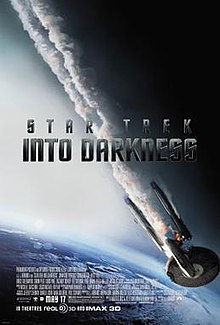
Back Star Trek Into Darkness AN ستار تريك إلى الظلام Arabic ستار تريك الى الظلام ARZ Пропадане в мрака Bulgarian Star Trek Into Darkness Breton Zvjezdane staze: U tami BS Star Trek Into Darkness Catalan Star Trek: Do temnoty Czech Star Trek Into Darkness Welsh Star Trek Into Darkness Danish
| Star Trek Into Darkness | |
|---|---|
 Theatrical release poster | |
| Directed by | J. J. Abrams |
| Written by | |
| Based on | Star Trek by Gene Roddenberry |
| Produced by |
|
| Starring | |
| Cinematography | Dan Mindel |
| Edited by | |
| Music by | Michael Giacchino |
Production companies | |
| Distributed by | Paramount Pictures |
Release dates |
|
Running time | 132 minutes[2] |
| Country | United States |
| Language | English |
| Budget | $185–190 million[3][4] |
| Box office | $467.4 million[4] |
Star Trek Into Darkness is a 2013 American science fiction action film directed by J. J. Abrams and written by Roberto Orci, Alex Kurtzman, and Damon Lindelof.[4] It is the 12th installment in the Star Trek franchise and the sequel to the 2009 film Star Trek, as the second in a rebooted film series. It features Chris Pine reprising his role as Captain James T. Kirk, with Zachary Quinto, Simon Pegg, Karl Urban, Zoe Saldaña, John Cho, Anton Yelchin, Bruce Greenwood, and Leonard Nimoy reprising their roles from the previous film. Benedict Cumberbatch, Alice Eve, and Peter Weller are also in the film's principal cast. It was Nimoy's last film appearance before his death in 2015. Set in the 23rd century, the film follows Kirk and the crew of USS Enterprise as they are sent to the Klingon homeworld seeking a former Starfleet member-turned-terrorist, John Harrison.
After the release of Star Trek, Abrams, Burk, Lindelof, Kurtzman, and Orci agreed to produce its sequel. Filming began in January 2012. Into Darkness's visual effects were created by Lucasfilm's Industrial Light & Magic. The film was converted to 3D during its post-production stage.
It premiered at Event Cinemas in Sydney, Australia, on April 23, 2013,[5] and was released in IMAX theaters in the U.S. on May 15, 2013, with release in standard-format theaters the next day.[6][7] Into Darkness was a financial success and received positive reviews from critics. Its gross earnings of over $467 million worldwide have made it the highest-grossing entry in the Star Trek franchise. It was nominated for Best Visual Effects at the 86th Academy Awards. It was followed by Star Trek Beyond in 2016.
- ^ a b c Adams, Mark (May 2, 2013). "Star Trek Into Darkness | Reviews". Screen Daily. Retrieved July 21, 2024.
- ^ "STAR TREK INTO DARKNESS (12A)". British Board of Film Classification. May 7, 2013. Archived from the original on June 18, 2013. Retrieved May 8, 2013.
- ^ "2013 Feature Film Production Report" (PDF). FilmL.A. March 6, 2014. p. 8. Archived from the original (PDF) on March 24, 2014.
- ^ a b c "Star Trek Into Darkness (2013)". Box Office Mojo. Retrieved June 21, 2016.
- ^ Ong, Thuy (April 23, 2013). "New Star Trek boldly voyages to Australia for premiere". Reuters. Archived from the original on September 24, 2015. Retrieved April 27, 2013.
- ^ Rigney, Todd (February 4, 2013). "Star Trek Into Darkness Hits Imax Theaters In 3D On May 15". The Inqusitir. Archived from the original on October 4, 2017. Retrieved February 5, 2013.
- ^ Stewart, Andrew (May 7, 2013). "Star Trek Into Darkness Moves to May 16". Variety. Archived from the original on June 6, 2013. Retrieved May 7, 2013.